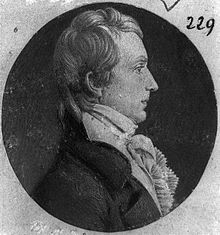James Breckinridge
| James Breckinridge | |
|---|---|
 |
|
| Member of the U.S. House of Representatives from Virginia's 5th district |
|
|
In office March 4, 1809 – March 3, 1817 |
|
| Preceded by | Alexander Wilson |
| Succeeded by | John Floyd |
| Member of the Virginia House of Delegates from Botetourt County | |
|
In office 1823 Alongside Allen Taylor |
|
|
In office 1819–1820 Alongside Jesse Rowland, Thomas Burwell |
|
|
In office 1806–1807 Alongside Charles Beale, Andrew Lewis |
|
|
In office 1796–1801 Alongside Thomas Madison, John Miller, William McClanahan |
|
|
In office 1789–1790 Alongside Robert Harvey, Martin McFerran |
|
| Personal details | |
| Born |
March 7, 1763 Botetourt County, Virginia |
| Died |
May 13, 1833 (aged 70) Botetourt County, Virginia |
| Political party | Federalist |
| Alma mater |
College of William and Mary Washington College |
| Profession | Attorney |
| Military service | |
| Rank | Brigadier-general |
| Battles/wars |
American Revolutionary War War of 1812 |
James Breckinridge (March 7, 1763 – May 13, 1833) was a Virginia lawyer and politician and a member of the Breckinridge family. He served in the Virginia House of Delegates, as well as the U.S. House of Representatives. He also fought in the American Revolutionary War and served as a brigadier-general during the War of 1812.
Breckinridge was born near Fincastle, Botetourt County, Virginia. His brother was John Breckinridge and he was the great-great-great-uncle of John Bayne Breckinridge. He studied under private tutors and during the Revolutionary War, he served in Colonel Preston's rifle regiment under General Nathanael Greene. He attended Washington College (now Washington and Lee University) and was graduated from the College of William and Mary in 1785. He studied law and was admitted to the bar and practiced in Fincastle.
He built Breckinridge Mill in 1822, to replace an earlier mill he built in 1804. It was listed on the National Register of Historic Places in 1980, with a boundary increase in 2002.
Breckinridge served as a delegate to the Virginia House of Delegates intermittently between 1789 and 1824. He took a special interest in the construction of the Chesapeake and Ohio Canal. He was then elected as a Federalist to the Eleventh Congress and to the three succeeding Congresses (March 4, 1809 – March 3, 1817). He was an associate of Thomas Jefferson in the establishment of the University of Virginia and served as brigadier general in the War of 1812.
...
Wikipedia
